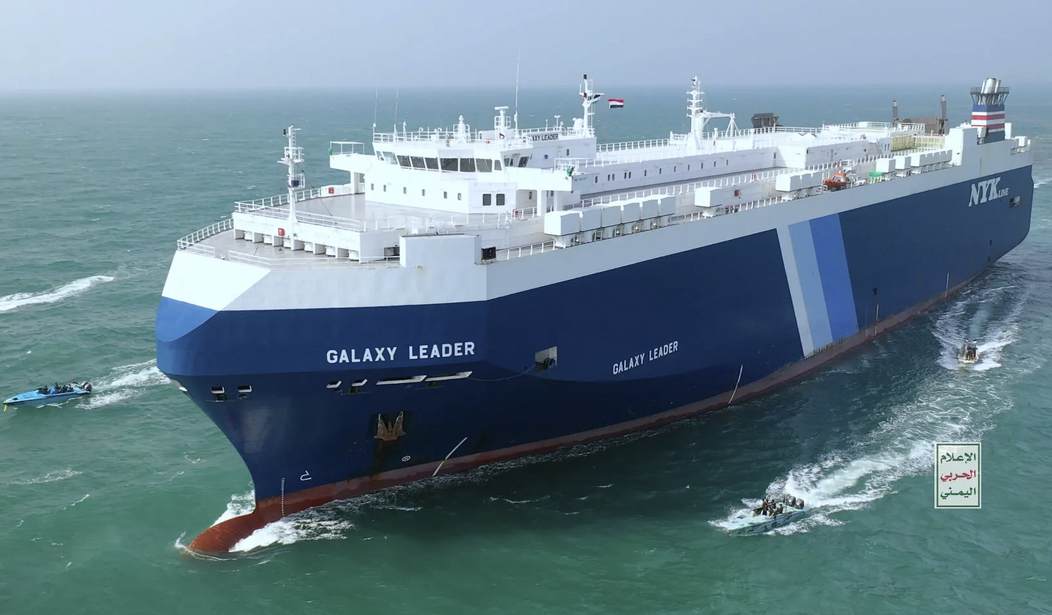Omani Foreign Minister Badr Albusaidi announced on Tuesday night that Oman had brokered a ceasefire deal between the Houthi rebels and the U.S. The Houthis had been attacking shipping in the Red Sea, sending insurance premiums for carriers through the roof and giving many shippers pause in exposing their ships to the danger.
"Neither side will target the other... ensuring freedom of navigation and the smooth flow of international commercial shipping" in the Red Sea, Albusaidi added in his statement.
Donald Trump said that the Houthis had "capitulated." That's not exactly how the Houthis would characterize their decision to halt the missile and drone attacks on shipping.
For 50 days, the U.S. Navy and Air Force pounded Houthi positions, destroying military assets and infrastructure until finally, at the reported urging of Iran, the Houthis agreed to a ceasefire.
The Houthis are about all that's left of Iran's "Axis of Resistance" to Israel. Hamas and Hezbollah, as well as many Shiite militias, have had their ranks thinned considerably by a relentless bombing campaign by Israel.
Israel's attacks on the Houthis in Yemen are not likely to end anytime soon. The terrorists just targeted Israel's Ben Gurion Airport with a missile attack that led to Israel striking back and nearly obliterating Yemen's Sana'a International Airport.
For their part, the Houthis say they will continue to attack Israeli ships. In the past, that distinction hasn't meant much. And the U.S. Navy says it foiled an attack on one of our aircraft carriers after the ceasefire supposedly went into effect. It may not have been the Houthis, given that several militias in the region are also targeting shipping in sympathy with the Palestinians. The Navy is investigating.
That Iran has tried to restrain the Houthis is significant. Tehran has been supplying the Houthis with large, sophisticated missiles that can be fired from almost anywhere in Yemen. This poses a problem for Israel because of the distance involved. It's more than 1,200 miles from Israel to targets in Yemen. Consider that Israel could strike Hezbollah in Lebanon or Hamas in Gaza in a matter of minutes, while hitting the Houthis takes hours of flying. The raids take meticulous planning and, according to Amos Yadlin, the former head of the IDF Military Intelligence, this makes planning the missions extremely challenging.
Why is Iran trying to keep the Houthis from striking Western shipping? The Iranians are in far worse shape economically than they were a year ago.
“This is a country that’s creaking under the pressure of economic sanctions, sustained mismanagement and corruption,” said Sanam Vakil, director of the Middle East and North Africa program at Chatham House in London. “Ultimately, what they seek is durable sanctions relief, and they believe that Donald Trump could perhaps deliver that in a way that the Biden administration couldn’t.”
There are signs that Tehran is worried about unrest at a politically sensitive time. The regime is quietly bracing for an eventual leadership change—Khamenei is 85 years old and has a history of illness. The reach of its military power has diminished abroad. Israeli attacks have crippled Iran-backed militias in the Gaza Strip and Lebanon, while a revolution in Syria cost Tehran a close ally. The election last year of reformist President Masoud Pezeshkian signaled that Iran’s security establishment was open to some degree of change.
“This was the Pezeshkian bet, and that of the people who allowed him to run and to win, that if they don’t allow reform, the consequence will be revolution,” said Jon Alterman, director of the Middle East program at the Center for Strategic and International Studies, a think tank in Washington.
Sources told the Times of Israel that Trump's foreign policy fixer, Steve Witkoff, brokered the ceasefire deal in Oman over the last week. They added that the deal was also meant "to help build momentum in the Iran nuclear talks, which Witkoff has also been leading on behalf of the Trump administration," according to CNN.
The Iranian regime is teetering. Another round of street protests can happen at any time. The economic hardships make the protests even more likely. Iran's desperation for sanctions relief may be just what's needed to force Tehran to deal seriously with the U.S. about its nuclear program.
This will almost certainly force Iran to keep the Houthis under control while nuclear negotiations are underway. It's not that Iran wants to stop the attacks on Red Sea shipping. It's that it has no choice.










